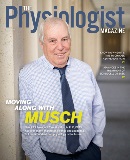Unveiling the Wonders of Physiology to the Next Generation
By Austin Robinson, PhD
 I still remember it vividly: As a teenager, I found myself Googling terms like “renin angiotensin aldosterone.” I had very little knowledge or passion for human physiology, but I was curious about my high blood pressure and how a medication called lisinopril worked.
I still remember it vividly: As a teenager, I found myself Googling terms like “renin angiotensin aldosterone.” I had very little knowledge or passion for human physiology, but I was curious about my high blood pressure and how a medication called lisinopril worked.
A few years prior, I had participated in an immersive STEM program for underrepresented youth at Notre Dame University in Indiana. The program was focused on engineering, and my favorite activity was the week we disassembled and reassembled a computer. However, I still remember our discussions about the scientific method and testing hypotheses.
Looking back, I think my participation in the STEM program and my personal experience with elevated cardiovascular risk as a teen sparked my passion for human physiology. I went on to normalize my blood pressure through diet and exercise. Through advanced courses in physiology and biochemistry, and my own research projects, I grew to appreciate how and why various health behaviors and pharmaceutical drugs impact our physiology and health.
Now, as a faculty member, I strive to recreate for others the transformative experiences that shaped my own scientific journey. With the pressures of securing funding, “publish or perish,” and the heavy administrative load that comes with being a principal investigator, it’s easy to lose sight of what drove us to science. Science outreach has become an integral part of my story and one of the many ways I stay inspired.
Over the past few years, my laboratory has participated several times in programs for high school students that the Auburn University Truman Pierce Institute in Alabama sponsors. My team has immersed students in hands-on activities. We have shown students how to measure cardiorespiratory fitness using indirect calorimetry and incremental exercise on a treadmill. We have demonstrated beat-to-beat blood pressure assessments during exercise. We have also shown students how to image blood vessels using ultrasound and demonstrated how skeletal muscle blood flow rapidly and drastically increases during exercise.
It’s really inspiring to see how these immersive science experiences ignited a spark in the students. They asked questions and made connections. They wanted to know why exercise is good for blood pressure, how poor circulation can adversely affect health and why their hand goes numb when they sleep on their arm. These initiatives served to break down barriers and demonstrate that science is not confined to textbooks and lectures but surrounds us in everyday life. By sharing our excitement about science, we empowered students to make informed decisions about future career paths. A few students told us they had never considered science as a career before taking part in the program but now they were interested in finding out more about physiology.
Science outreach provides a platform for inclusivity, addressing racial and gender gaps that have long plagued STEM fields. Most of the students we have hosted have been African American teens from around the state of Alabama. My hope is that my lab continues to play a role in inspiring a new generation of science trailblazers. I would encourage all APS members to consider opening their labs to the next generation. It might just give you that little extra bit of inspiration you need to get through that next IRB or IACUC application and backlog of emails.
Austin Robinson, PhD, is an associate professor in the School of Kinesiology and director of the Neurovascular Physiology Laboratory at Auburn University in Alabama.
This article was originally published in the September 2023 issue of The Physiologist Magazine.
The Physiologist Magazine
Read the Latest Issue
Don’t miss out on the latest topics in science and research.
View the Issue Archive
Catch up on all the issues of The Physiologist Magazine.
Contact Us
For questions, comments or to share your story ideas, email us or call 301.634.7314.


